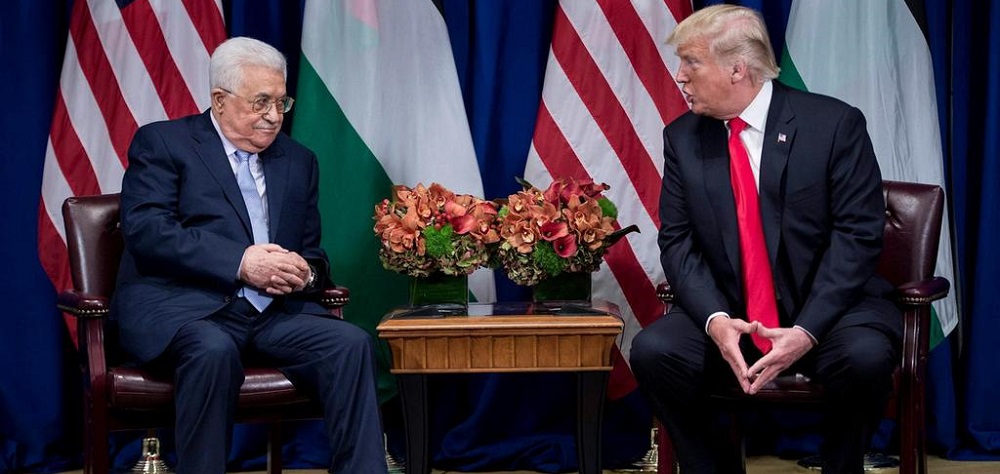Alwaght- As the White House prepares to officially unveil President Donald Trump’s initiative, known as “the deal of the century”, about the Israeli-Palestinian conflict, in this month, the engaged parties are reacting to the plan, with Tel Aviv expressing happiness and the Palestinians strongly opposing. The American circles have lately talked about forming a Jordanian-Palestinian confederation covering the whole Jordan and the remaining Palestinian territories. The idea drew various reactions. In an initial reaction, President of the Palestinian Authority Mahmoud Abbas, who first publicized the plan, agreed to a confederation under the condition that the Israeli regime be part of it.
The stance, largely equivocal, has been well received by the Israeli media which welcomed Abbas green light to the initiative. Jordan and Hamas, the Gaza-based Palestinian movement, essentially opposed the initiative. Jumana Ghuneimat, the spokesperson to the Jordanian government, echoing the stance of Jordan's King Abdullah, said that joining the kingdom with the West Bank — the bulk of the area Palestinians want for a future state and controlled by Israeli regime since 1967 — is not a matter that is open for discussion.
“Discussing the idea of a confederation with the regions of the West Bank is not possible,” she was quoted as saying by the monarchy's Khaberni news agency.
Hamas also came against the idea and the approval by Abbas. Hazem Qassim, the spokesman of Hamas, told the media that Abbas's remarks in favor of the plan meant his withdrawal from the Palestinian national reconciliation process and a help to the “Israeli occupation.”
Before any elaboration, there must be a focus on the American goals behind raising the idea and its history, having in mind that the initiative is not new and in the past the Americans pressed the Palestinians for a confederation with Jordan.
Jordanian-Palestinian confederation, a forgotten project
In the early ‘80s, King Hussein and Yasser Arafat had a plan to create a confederation between Jordan and Palestine, after Israel would withdraw to the 1967 border and without either member of the confederation recognizing Israel.
Most of the plan was accepted but later abandoned, largely due to a disagreement over the division of responsibilities and the status of each component. The initiative was adopted in 1984 due to decline in the power of the Palestinian Liberation Organization (PLO), the Palestinian National Council held its summit in Amman, the Jordanian capital and agreed to a Jordanian-Palestinian cooperation accord. At the time, Jordan was acting as a communication channel between the US and the Palestinians. But the Palestinian-Jordanian relationship was suspended in mid-1985 mainly under the duress of the regional pressures and the domestic split of the PLO. In 1988, King Hussein fully cut off the legal and administrative relation with the West Bank. This put an end to all of the joint projects and cooperation plans and shelved the confederation program.
Since then, the initiative has been surfaced occasionally, including by the Israeli Prime Minister Benjamin Netanyahu, with terms essentially different from the 1980s version upheld by King Hussein and Arafat. Nearly a decade ago, the Israeli PM struggled to revive the plan. According to his version, al-Quds (Jerusalem) will escape split into eastern (Palestinian-controlled) and western (Israeli-controlled) parts and remain intact the Israeli state’s capital.
Confederation and its risks
The Abbas response to the American initiative and his suggestion that he would discuss it if the Israeli regime join the confederation has a goal behind it. He knows that with the relocation of the American embassy from Tel Aviv to al-Quds and disclosure of the American “deal of the century” the Israelis and the Americans do not intend to allow a Palestinian state to come to existence, or recognize it in case it is formed in the future. And so, the Israelis do not agree with his suggestion. After all, an independent state of Palestinian is a prerequisite for a confederation.
Abbas’s covert opposition to the confederation idea revival, while the Palestinian factions and the whole Muslim countries stand with pro-liberation efforts, can have only one reason: He does not want escalated tensions with the White House. He is cautious not to stir Washington's fury as the word spread that the Americans are seeking an alternative to Abbas as a president of the Palestinian Authority, who can assure them he will act in line with their plans.
But a look at the American objective behind reviving the initiative leaves no question about the Palestinian need to firmly stand against it.
First, the confederation project falls under the deal of the century and is part of it. It is devised to serve as a solution to the Palestinian demand for the right of the refugees to return. In case of implementation, one of the key Palestinian, and also Jordanian, demands, namely the right to return home, will be spurned. The Palestinian refugees in Jordan, whose number is put at over 5 million which is the largest Palestinian population in a foreign country, should forget their dreams to return home. Recent funding cut for UNRWA (United Nations Relief and Works Agency for Palestinian Refugees) by Trump serves a refugee cause-liquidating agenda. According to the deal of the century, the confederation implementation takes the Palestinians to concede the al-Quds and settlement lands in the West Bank to the Israeli regime.
Second, the confederation will exclude the Gaza Strip, which, according to the Israeli Haaretz newspaper, will go under the Egyptian control.
Hamas reasons for its opposition are more than one. The movement argues that Abbas readiness to entertain the idea is free assistance to the Americans who want to help Tel Aviv entomb the Palestinian cause, steal Al-Quds, kill the return right, and eliminate UNRWA. Jordan government and its Islamic Action Front, a Muslim Brotherhood branch, fearing that the confederation is a cover scenario to settle the Palestinians in Jordan as a new homeland, rejected the plan. This opposition might be the first signal of the stillbirth of Trump’s century deal.



























